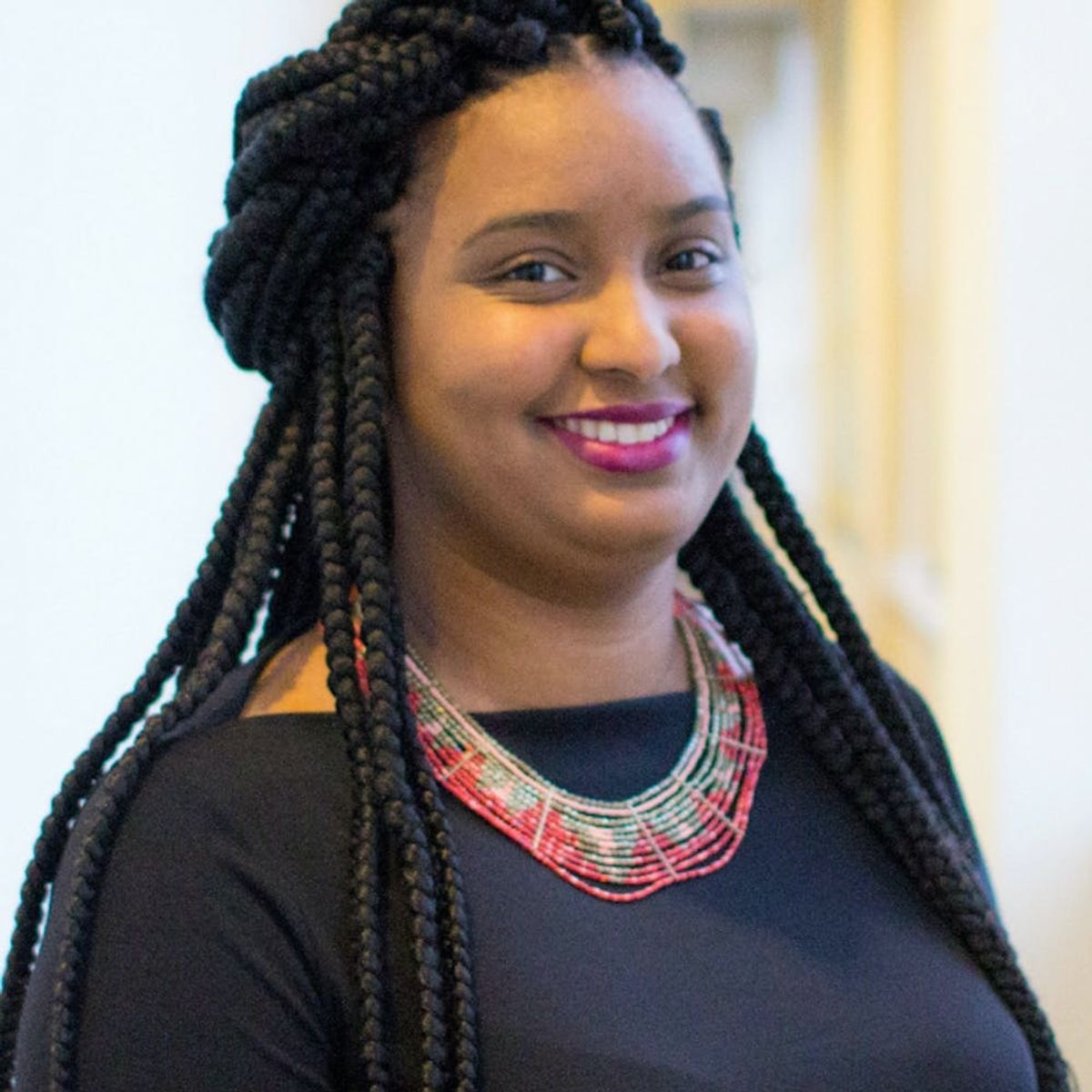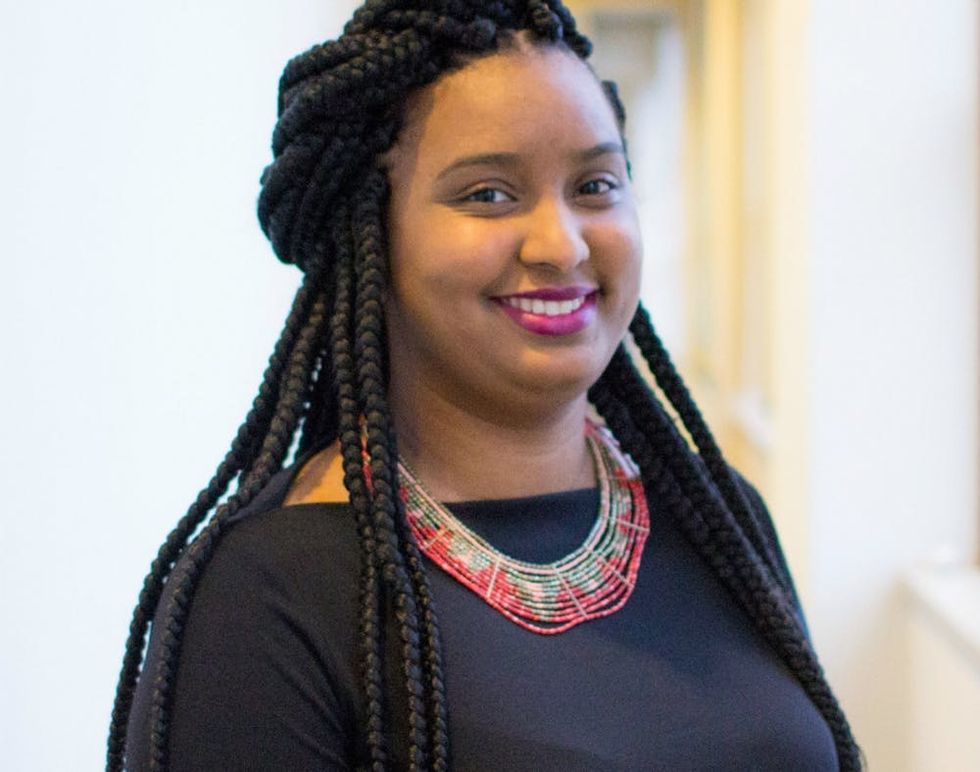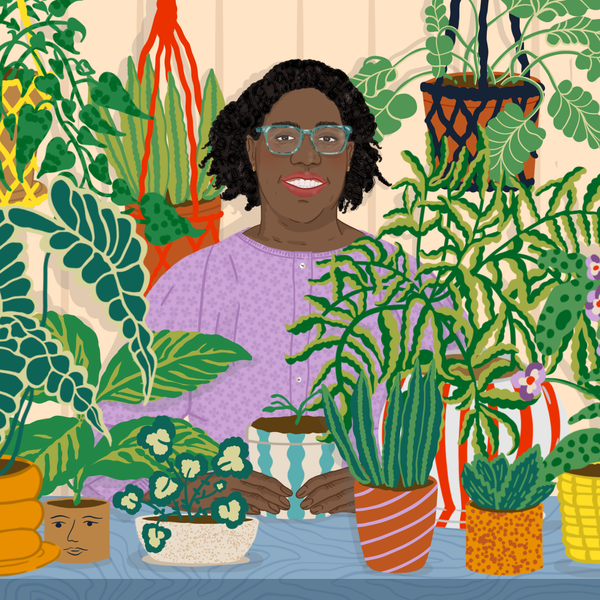As Director of Education for The Fortune Society, Smith is dedicating her life to giving people second chances.
Brittany Smith Went from Harvard to Prison — Now, She’s on a Mission to Change Lives


Be the Change looks at real-life projects and inspiration to make the world better.
In 2009, Brittany Smith was two weeks away from her Harvard graduation when her plans were derailed. A run-in with law enforcement landed her in court fighting seven felony charges. In 2011, she entered prison as a first-time offender.
“It wasn’t the path that I thought my life would take,” she tells us, “but I knew I needed to do something with myself during this time.” In order to finish her education, Smith made the difficult decision to turn down the opportunity to move to a low-security facility and remain in a high-security prison where she could enroll in Boston University’s Prison Education Program.
Out of prison and armed with a college degree, Smith sees her experience as a tool for effecting change — something she’s always wanted to do.
“I’d interned with The Fortune Society” — an organization that support people who’ve just left prison in their successful reentry to society — “at Harvard, and I came back to Fortune as a teacher,” she says. “The first time I shared my experience, I cried in the classroom. It was the first time I talked about it with people who didn’t know me before I was incarcerated, and it was one of the most therapeutic experiences of my life.”
As The Fortune Society’s Director of Education, Smith now works to build a pathways for formerly incarcerated people to find stability and success as they rejoin their communities. We talked to her about her mission to change lives.

Brit + Co: You were two weeks away from graduating from Harvard when your life changed completely. Can you tell us your story?
Brittany Smith: I grew up in Harlem and I went to Frederick Douglass Academy, which at the time was one of the best high schools in the city. My time there really fostered my love of education. Leaving for Harvard was one of the most difficult things I’ve ever done in my life. It was so different from everything I knew and in the beginning I constantly questioned who I was in this institution. I didn’t come from the places that these students came from, I didn’t have access to the same opportunities they did, and I didn’t travel the world like so many had.
I studied race and ethnic relations during my time there, including the criminal justice system and what communities like mine need. By senior year I had finally found my place at Harvard and had built a support system both at school and at home with my family and friends, but two weeks before getting my diploma I found myself in a situation that prevented me from graduating.
B + C: You’re currently the Director of Education with The Fortune Society. How did you get there and what’s the focus of your work?
Smith: The Director of our Alternative to Incarceration program allowed me to work closely with that program. ATI is a diversion program that reduces the prison and jail population by providing individuals with holistic supportive services. I worked closely with the counselors to facilitate social support groups, specifically working with women around issues of self-worth and empowerment. The experience really resonated with me because I shared many of the same experiences as the women [and] came from the same type of environment, but thanks to my support system my trajectory took me to college.
In my role at Fortune, I really try to focus on building a community and learning environment where our students can thrive. For some, the classroom also serves as a means to build confidence in addition to skills. For others, being in the classroom provides a sense of belonging and a community. Another goal at Fortune is to empower them to become active members of the community. We’ve attended lobby days in Albany, engaged students in rallies at City Hall, and marched to the governor’s New York City office. We work with them to identify what they’re passionate about and get involved in advocacy and civic engagement.
B + C: There’s a staggering number of problems with the US criminal justice system. Punishment far too harsh for the crime, mass incarceration (the US is home to less than five percent of the world’s population, yet jails and private prisons house close to 25 percent of the world’s prisoners), racialized sentencing, for-profit institutions, overcrowding, gang violence, underfunded mental health and drug treatment programs, a lack of support for people leaving the system… to name just a few areas that are in dire need of intervention. What inspired you to tackle the specific problem of reintegration?
Smith: [It] really stemmed from my early experience interning at The Fortune Society and my own experiences with the criminal justice system. After my release, intellectually I knew that I could work in any number of fields: I had a great education, work experience in various fields, supervisory experience, and volunteer experience. I never thought the system would touch me, as an individual.
My family and my friends were with me every step of the way but my embarrassment and shame prevented me from turning to them. The moment I got accepted to Harvard, I was put on a pedestal [as] the girl that would “make it” despite all the hardship I faced growing up. While no one ever said any different, I knew that my status changed [after being incarcerated]. I had internalized the stigma of being formerly incarcerated. I felt that if I was struggling this much knowing I had such a great support system and strong educational and professional background, the same thing was happening to those who did not.
Fortune is more than the services it provides, it’s a support system that enables people to move toward their potential and supports them to work against social and internalized stigma. One of the ways is through participants seeing themselves reflected in the staff, to understand that success isn’t limited by their criminal justice experience and to know they aren’t defined by the circumstances that brought them to Fortune.
B+C: What’s lacking in the typical kind of support that people get when they’re released from prison? What are some of the most daunting barriers that prevent them from successfully reintegrating into society on both economic and social levels?
Smith: Challenges include unstable housing, diagnosed and undiagnosed mental health disabilities, unemployment and substance use — in addition to the trauma of incarceration. Individuals are stigmatized by society and often don’t know how to navigate systems of support and service providers or don’t even know these programs exist. It seems unrealistic to expect someone to maintain employment when they have nowhere to sleep at night. Or to attend treatment programs when they don’t have steady meals.
The Fortune Society recognizes that individuals have intersecting needs and work toward achieving this through a true integration of services. For example, we provide holistic education and employment opportunities that guide participants into the re-entry process. We offer programs centered around wellness, food, and nutrition, topics that are rarely discussed in the narrative around reentry but is of the utmost importance in ensuring long term health and success. We create access to safe and affordable housing [and] we also hire staff who have personal experience in the criminal justice system. Nearly 50 percent of our staff have a history with incarceration, so they understand the most effective ways to help individuals come home to their communities.
B+C: When we talk about the judicial and prison system in America, we tend to throw around the word ‘justice’ quite a bit. Roxane Gay has pointed out that justice is never this balanced, transactional process even though we tend to think of it that way (the whole ‘scales of justice’ imagery doesn’t help). Does the way we think about justice need to change in order for the way we treat incarcerated people (and formerly incarcerated people) to change?
Smith: One of the notions that society attaches to prison is that individuals are “paying their debt to society.” If that’s the case, when the debt is paid why do formerly incarcerated people continue to pay in so many forms? [Like] housing, education and employment discrimination and disenfranchisement. When individuals try to move forward post-incarceration there are so many obstacles, yet society simultaneously demands they become productive members while preventing them access. What message do people receive when we acknowledge the system is broken yet continue to heavily penalize those directly impacted?
It’s astounding to me that it was necessary to remove the question about arrest history from college applications (which is still is not universal), or that being convicted of certain crimes makes one ineligible for federal financial aid for school. Formerly incarcerated individuals are denied their civil rights through voter disenfranchisement. They can be overqualified for a position and still denied because of incarceration 20 years ago.
I think it’s important to understand that who we are cannot be defined by a single event. How can we expect to decrease the prison population if we’re constantly reinforcing systems that create incarceration without providing systems for successful reentry? Changing the narrative around incarceration is not as simple as changing the way we think about justice or the way we treat incarcerated and formerly incarcerated people, it’s the very arduous process of dismantling otherness, removing labels, attacking systems of oppression and focusing on the human factor.
Want to help? Visit The Fortune Society to find out how you can give a monetary donation or volunteer your time.
(Image via Elle Communications)



















